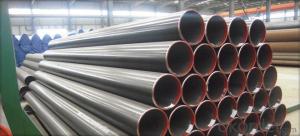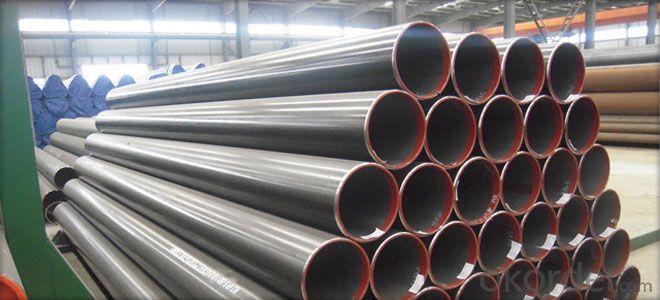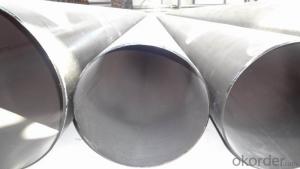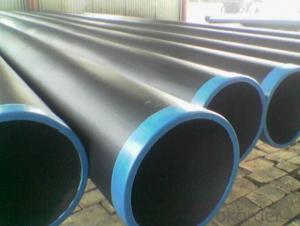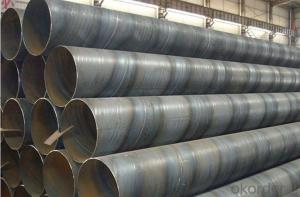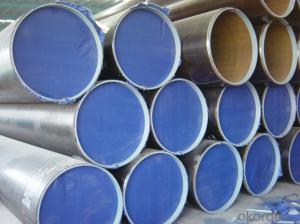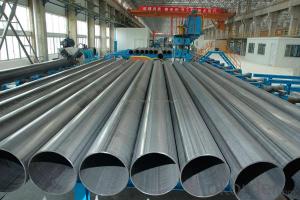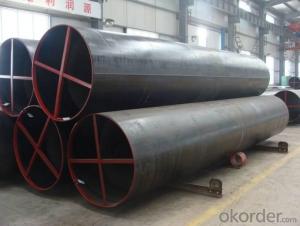X52 LSAW STEEL PIPE
- Loading Port:
- China Main Port
- Payment Terms:
- TT or LC
- Min Order Qty:
- -
- Supply Capability:
- -
OKorder Service Pledge
OKorder Financial Service
You Might Also Like
Product Description:
1、Structure of Welded Steel Tube:
Welded Steel Tube is formed by drawing a solid billet over a piercing rod to create the hollow shell. We are company that have many years experience and professional manager team and engineer team and sales team, sure we will provide you high quality of welded pipe and professioanl service.
2、Main Features of the Welded Steel Tube:
• High manufacturing accuracy
• The higher strength
• The small inertia resistance
• Strong heat dissipation ability
• Good visual effect
• Satisfy price
3、Welded Steel Tube Specification:
Standard | GB, DIN, ASTM ASTM A106-2006, ASTM A53-2007 |
Grade | 10#-45#, 16Mn 10#, 20#, 45#, 16Mn |
Thickness | 8 - 33 mm |
Section Shape | Round |
Outer Diameter | 133 - 219 mm |
Place of Origin | Shandong, China (Mainland) |
Secondary Or Not | Non-secondary |
Application | Hydraulic Pipe |
Technique | Cold Drawn |
Certification | API |
Surface Treatment | factory state or painted black |
Special Pipe | API Pipe |
Alloy Or Not | Non-alloy |
Length | 5-12M |
Outer Diameter | 21.3-610mm |
Grade | 20#, 45#, Q345, API J55, API K55, API L80, API N80, API P110, A53B |
Standard | ASME, ASTM |
1) Material:20#(ASTM A 106/A53 GRB.API5LGRB,GB),45#,16Mn,10#.
2) Specification range:OD:21.3-610mm,WT:6-70mm,length:6-12m or according to the requirement of clients.
3) Excutive standards:GB,ASME API5L.ASTM A 106/A53,Despite of the above standards,we can also supply seamless steel pipe with standard of DIN,JIS,and so on,and also develop new products according to the requirements of our clients!
4) Surface:black lacquered,varnish coating or galvanized.
5) Ends:Beveled or square cut,plastic capped,painted.
6) Packing:bundles wrapped with strong steel strip,seaworthy packing.
4、Packaging & Delivery
Packaging Details: | seaworthy package,bundles wrapped with strong steel strip |
Delivery Detail: | 15-30days after received 30%TT |
5、FAQ of Welded Steel Tube:
①How is the quality of your products?
We have many years business experience in this area, and we have professional engineer and manager team and sure we can provide you high quality production and professional service.
②How about price?
Yes, we are factory and be able to give you lowest price below market one, and we have a policy that “ for saving time and absolutely honest business attitude, we quote as lowest as possible for any customer, and discount can be given according to quantity”,if you like bargain and factory price is not low enough as you think, just don’t waste your time.Please trust the quotation we would give you, it is professional one.
③Why should you chose us?
Our service formula: good quality+good price+good service=customer’s trust
SGS test is available, customer inspection before shipping is welcome, third party inspection is no problem.
6、 Welded Steel Tube Images:
- Q: Can steel pipes be used for swimming pool installations?
- Indeed, swimming pool installations can make use of steel pipes. Renowned for their robustness and power, steel pipes emerge as an apt alternative for both subterranean and aboveground swimming pool plumbing systems. These pipes possess the capacity to endure elevated water pressure and resist the deteriorating impact of pool chemicals. Moreover, steel pipes exhibit resilience against harsh weather conditions and can be effortlessly installed and maintained. Nevertheless, it remains crucial to guarantee appropriate treatment and coating of the steel pipes to avert rust and corrosion.
- Q: Can steel pipes be used for telecommunications cables?
- No, steel pipes cannot be used for telecommunications cables. Telecommunications cables typically require materials with high electrical conductivity and insulation properties, such as copper or fiber optics. Steel pipes are not suitable for transmitting signals and would interfere with the transmission of data.
- Q: What is the difference between carbon steel and alloy steel pipes?
- Carbon steel pipes and alloy steel pipes are two distinct types of steel pipes, characterized by their composition and properties. Carbon steel pipes, consisting mainly of carbon and iron, incorporate small quantities of other elements such as manganese, silicon, and copper. These pipes are renowned for their robustness and durability, making them a favored option in industries like construction, oil and gas, and automotive. Carbon steel pipes are relatively low-priced and exhibit commendable resistance to corrosion. In contrast, alloy steel pipes are produced by introducing additional alloying elements to carbon steel. These alloying elements encompass chromium, nickel, molybdenum, vanadium, and others. The incorporation of these elements augments the steel's properties, resulting in increased strength, superior corrosion resistance, and enhanced heat resistance. Alloy steel pipes are commonly employed in applications involving high temperatures and pressures, such as power plants, refineries, and chemical plants. Regarding cost, alloy steel pipes generally incur higher expenses compared to carbon steel pipes due to the inclusion of supplementary alloying elements. Nevertheless, the added advantages in terms of performance and longevity often justify the elevated cost. To summarize, the primary distinction between carbon steel and alloy steel pipes lies in their composition and properties. Carbon steel pipes primarily consist of carbon and iron, while alloy steel pipes contain additional alloying elements to enhance their properties. Carbon steel pipes are celebrated for their strength and affordability, whereas alloy steel pipes offer improved strength, corrosion resistance, and heat resistance.
- Q: What is the maximum allowable stress for steel pipes?
- The maximum allowable stress for steel pipes depends on various factors such as the grade of steel, diameter, wall thickness, and the intended application. It is typically determined by industry standards and codes, such as the American Society of Mechanical Engineers (ASME) Boiler and Pressure Vessel Code. Therefore, there is no one-size-fits-all answer to this question.
- Q: What is the difference between standard wall thickness and extra-strong wall thickness steel pipes?
- The main difference between standard wall thickness and extra-strong wall thickness steel pipes lies in their thickness and durability. Standard wall thickness pipes have thinner walls and are suitable for most general applications, while extra-strong wall thickness pipes have thicker walls and are designed for heavy-duty or high-pressure applications. These extra-strong pipes offer enhanced strength and resistance, making them more reliable and suitable for handling extreme conditions or demanding projects.
- Q: Can steel pipes be used for underground air supply systems?
- Indeed, underground air supply systems can make use of steel pipes. Due to their robustness, endurance, and ability to withstand external forces like corrosion and impact, steel pipes are frequently employed in underground settings. They possess the capacity to endure the pressure and temperature prerequisites of air supply systems while also being effortlessly installed below ground. Moreover, steel pipes boast an extended lifespan, rendering them a financially prudent option for underground air supply systems. Nonetheless, when selecting the suitable steel pipes for a particular underground air supply system, it is crucial to take into account factors such as soil conditions, potential for corrosion, and local regulations.
- Q: What are the safety precautions when working with steel pipes?
- When working with steel pipes, it is important to follow certain safety precautions to prevent accidents and injuries. Some key safety measures include wearing appropriate personal protective equipment (PPE) such as gloves, safety goggles, and steel-toed boots to protect against cuts, burns, and impacts. Additionally, workers should be trained on proper handling and lifting techniques to avoid strains and sprains. It is crucial to inspect the pipes for any defects or damage before use and ensure they are properly secured to prevent them from falling or rolling. Finally, maintaining a clean and organized work area, using caution signs, and following proper procedures for cutting, welding, and handling flammable materials are essential for a safe working environment.
- Q: What is the maximum length of a steel pipe?
- The maximum length of a steel pipe will vary depending on various factors such as manufacturing capabilities, transportation limitations, and practical considerations. However, in general, steel pipes can typically be manufactured and transported in lengths ranging from a few meters to several hundred meters.
- Q: Are galvanized steel tubes the same as degaussing steel tubes?
- And the method of magnetic field created by means of electromagnets or permanent magnets. For analysis of residual magnetism, see table (1), select the demagnetizing method and system in combination with the conditions of the construction site (for example, given equipment, etc.). Table 1 magnetic remanence grade and welding conditions
- Q: How are steel pipes protected against rust?
- Steel pipes can be safeguarded against rust in various ways. One popular approach entails applying a protective coating to the pipes. This can be achieved through the use of a paint layer, epoxy, or a corrosion-resistant coating like zinc or galvanized coatings. These coatings act as a barrier between the steel and moisture, preventing rust formation. Another technique for shielding steel pipes from rust involves cathodic protection. This method employs sacrificial anodes, typically composed of zinc or magnesium, which are affixed to the steel pipes. These anodes corrode instead of the steel, sacrificing themselves and preventing rust on the pipes. In addition to coatings and cathodic protection, corrosion inhibitors can also be employed to protect steel pipes against rust. Corrosion inhibitors are chemicals that are added to the water or fluid flowing through the pipes. These chemicals generate a protective film on the steel's surface, inhibiting corrosion and preventing rust formation. Furthermore, regular maintenance and inspections play a vital role in safeguarding steel pipes against rust. Promptly addressing any signs of damage or wear on the protective coatings is crucial to prevent rust formation. Additionally, ensuring that the pipes are properly cleaned and dried before applying protective coatings can enhance their effectiveness. In summary, a combination of protective coatings, cathodic protection, corrosion inhibitors, and regular maintenance is utilized to effectively shield steel pipes against rust and corrosion. This approach prolongs their lifespan and maintains their structural integrity.
Send your message to us
X52 LSAW STEEL PIPE
- Loading Port:
- China Main Port
- Payment Terms:
- TT or LC
- Min Order Qty:
- -
- Supply Capability:
- -
OKorder Service Pledge
OKorder Financial Service
Similar products
Hot products
Hot Searches
Related keywords
